INTRODUCTION
Searching for Rights in Missouri History
Kenneth H. Winn
THE ESSAYS IN THIS volume examine and explain Missouri law, and in so doing, illumine the American past. Legal history is uniquely suited to helping us understand our history as people. When the territory of the Louisiana Purchase transferred from France to the United States, lawyers rushed in faster than farmers. Ever since, practically every issue one can imaginesome of great importancehas become an issue of law, and so it continues, as this volume shows, to the present day.
As Missouris new state archivist in the early 1990s, I looked at a small collection of circuit court records from Pemiscot County from the 1920s. Pemiscot is one of the most impoverished and sparsely settled counties located in Missouris Bootheel. There were neither famous names nor famous cases in the records, but I was bowled over by the picture of ordinary life that emerged from the routine discussions of prohibition, race relations, politics, and the important environmental change that was transforming the region at the time. That experience convinced me that such records were much underused by historians. They could provide insights into the past found nowhere else. That conviction was partially responsible for the eventual appearance of this book.
While one could write very useful essays about everyday life, it is easier to see these ten essays as chapters in the story of Missourians search for their rights. Although the essays were not chosen for this perspective, they nevertheless point in this direction. By rights, a contentious term, I refer to a specific moral claim that transcends ordinary law and compels recognition of rights (entitlements), privileges (liberties), powers, and immunities for specific individuals or peoples. These rights have proven historically adaptable: old rights lose their meaning, and new ones are discovered or asserted. Some chapters in this volume began as stories of political and human rightsthose of women and slaves, for example. But most of the events recounted here arose from mundane, if sometimes tragic, circumstancesa car wreck, a failed marriage proposal, a murder, a juveniles bad behavior, an insurance case, a property quarrel, an employment contract dispute. As the authors show, seemingly simple issues unexpectedly put much larger principles at stake, and the cases turned into serious power struggles that, in time, came to illustrate important issues in American society.
Several of these essays are based on information previously unknown to history. When I invited the authors to write for this volume, I asked each of them to develop a topic with scholarly rigor but write about it in an interesting way that would make it accessible to nonlawyers. The authors have attempted to explain or avoid legal phrases not familiar to educated laypersons. They, of course, have retained their own unique voices and points of view, but this basic guideline set the tone for what follows.
The chapters that resulted discuss significant topicsthe uneasy incorporation of ethnic and cultural populations into the United States, political loyalty tests, the alleviation of cruelty to poor and criminally institutionalized children, the restriction on womens ability to sit on juries decades after they had won the right to vote. Some chapters tell of cases that caught the nations attentiona slaves suit for his freedom, a womans quest for female suffrage, a scandal that led to national judicial reform, and a fight over a tragically injured womans right to die. All of the controversies had lasting significance.
The book formally begins with William E. Foleys masterly essay, Testing the Limits of American Justice: Indian Trials in Nineteenth-Century Missouri. Following the Louisiana Purchase, the territory soon to be known as Missouri became a testing ground for attempts by U.S. authorities to force native peoples before the American bar of justice. Foley shows how Missouris nineteenth-century Indian cases ran the gamut from criminal proceedings involving charges of murder, assault, and stealing to civil suits alleging illegal enslavement and contesting inheritance rights. These cross-cultural judicial proceedings evoked strong feelings, raised complicated legal and policy questions, underscored the differences between Indian and white notions of justice, and revealed the declining fortunes of once-dominant Indian nations. Beyond that, the records they generated give voice to lesser-known native people whose compelling stories had been long since forgotten.
The cultural divide between Native Americans and whites during the territorial period was vast, but divisions within the white community were endemic, if far less deadly. For instance, an unusual frontier sexual arrangement started a bitter quarrel that casts light on the periods social and economic tension. In The Frown of Fortune: George Sibley, Breach of Promise, and Anglo-Francophone Conflict on the Missouri Frontier, I tell the previously unknown story of the 1813 lawsuit against George Sibley for breach of promise. Well remembered by historians, Sibley began his career as a politically connected factor, or government Indian trader, at remote Fort Osage, a military post near present-day Kansas City. During his service, the thirty-year-old Sibley became involved with a fifteen-year-old French girl named Ellen Lorr. She later claimed that he wrote out a marriage contract; in his version, he contracted her to be his concubine. When Sibley failed to formally marry Lorr upon their return to St. Louis, she sued him for breaching his promise of marriage. Enter the wealthy and powerful Indian trader Pierre Chouteau, an economic rival and personal enemy of Sibleys. When Chouteau stepped in on the girls behalf, the legal battle proved much less unequal than it had first seemed. What had begun years before as a personal quarrel between Sibley and Chouteau blossomed into a larger contestwith Lorr now as its pawnbetween the ethnic French and the Yankee newcomers.
One thing that both the Yankees (that is Easterners, as even people from Virginia and Kentucky were once locally called), and the Francophones (like the Chouteaus) had in common in the period was a devotion to the institution of slavery. But as in all species of ownership, there were legal rules that slaveholders had to obey in handling their human property if they wanted to keep it. For example, people did not take their slaves to live in free states or territories and expect to retain them, even should they eventually return to a slave state. If they violated basic rules like these they lost their propertyor at least that is the way Missouri slave laws worked during most of the antebellum years.
Then on April 6, 1846, an obscure St. Louis slave represented by an obscure lawyer petitioned the local circuit court to release him from his bondage. What made this case so unusual was neither the slave nor the grounds for his petition. It was that powerful white men began arguing about his freedom. When the United States Supreme Court finally decided the Dred Scott case eleven years later, it shook the country to its foundation, and edged it closer to civil war. Given the national implications of the federal decision historians have tended to skip over the states legal proceedings, but they are interesting and important in their own right. In The Politics of Slavery and Missouris First Elected Supreme Court:



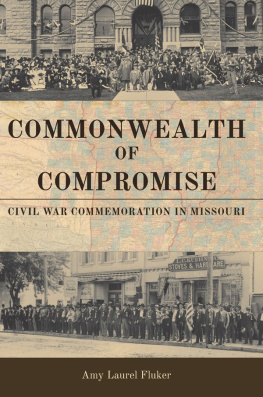
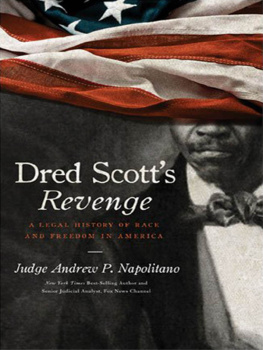
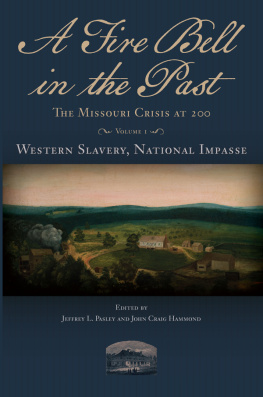
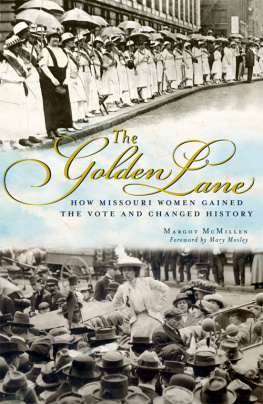
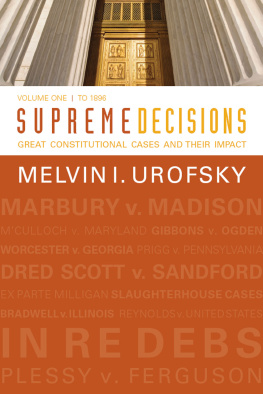
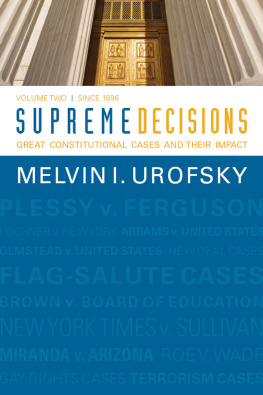
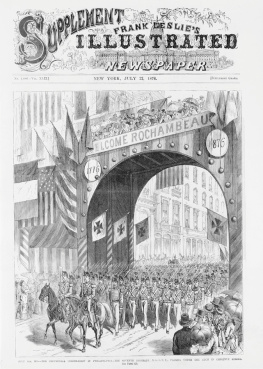
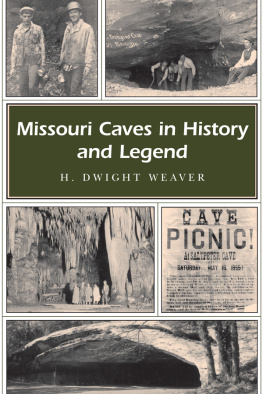


 This paper meets the requirements of the American National Standard for Permanence of Paper for Printed Library Materials, Z39.48, 1984.
This paper meets the requirements of the American National Standard for Permanence of Paper for Printed Library Materials, Z39.48, 1984.